#early feminism
Explore tagged Tumblr posts
Text

i’m going insane (i’m legit fine) (am i?) (idk) (glock in my mouth as i scroll through people’s followings)
57 notes
·
View notes
Text
Have you any notion of how many books are written about women in the course of one year? Have you any notion how many are written by men? Are you aware that you are, perhaps, the most discussed animal in the universe?
Virginia Woolf, A Room of One's Own
#Virginia Woolf#A Room of One's Own#book quotes#booklr#feminism#womanhood#nonfiction#literature#currently reading#english literature#essays#1920s literature#early feminism
11 notes
·
View notes
Text
“Miriam Kramnick (1978) is one of the few commentators on Wollstonecraft who outlines the nature of the ridicule she was subjected to and the significance of this form of sexual harassment. Wollstonecraft was the recipient of 'barely printable insults', states Kramnick. ‘Her own contemporaries called her a shameless wanton, a "hyena in petticoats", a "philosophizing serpent" or wrote jibing epigrams in the Anti-Jacobin Review, like
For Mary verily would wear the breeches
God help poor silly men for such usurping b…..s
Twentieth-century readers have called her an archetypal castrating female, "God's angry woman", a man hater whose feminist crusade was inspired by nothing more than a hopeless, incurable affliction — penis envy’ (ibid., p. 7).
Even feminists have been careful about associating with her and: ‘The name "Wollstonecraft", once considered synonymous with the destruction of all sacred virtues, disowned by the feminist movement as it marched for votes or pressed for admission to universities, became an obscure reference indeed’ (ibid., p. 8). When women sought to convince men that they were honourable, respectable, and deserving of equal representation in the institutions men had created for themselves, there was little room for Wollstonecraft, who had challenged those institutions and who had gained a ‘reputation.’
Like many of the reviews of Aphra Behn, some of the reviews of Wollstonecraft's work and life, on her death, were vicious. Her work should be read, declared the Historical Magazine (1799), ‘with disgust by any female who has any pretensions to delicacy; with detestation by everyone attached to the interests of religion and morality, and with indignation by anyone who might feel any regard for the unhappy woman, whose frailties should have been buried in oblivion’ (vol. I, p. 34). This was about as far as critics could go in the pre-Freudian days, but once he had made his priceless contribution, the attack on women who did not conform to the precepts dictated by men assumed a new and greater ferocity.
‘Mary Wollstonecraft was an extreme neurotic of a compulsive type,' argue Ferdinand Lundberg and Marynia Farnham (1959) in Modern Woman: The Lost Sex. Out of her illness arose the ideology of feminism, which was to express the feelings of so many women in years to come. Unconsciously ... Mary and the feminists wanted ... to turn on men and injure them.... Underneath her aggressive writings, Mary was a masochist like her mother, as indeed all the leading feminist theorists were in fact.... By behaving as she did Mary indicated.... that she was unconsciously seeking to deprive the male of his power, to castrate him. It came out in her round scolding of men. The feminists have ever since symbolically slain their fathers by verbally consigning all men to perdition as monsters' (pp. 159-61). Really?
With the framework formulated by Freud, it again became easy to ridicule and harass women who developed any analysis of patriarchy, to dismiss them without having to refute their ideas. The scientific dogma took over from the religious dogma which had been seriously discredited (by women like Wollstonecraft) and both these male-decreed belief systems have been used ruthlessly against individual women and against women collectively. In her own day Mary Wollstonecraft was maligned for her moral sickness; with the advent of Freud it was her mental sickness. The principle is the same and it was a principle that Wollstonecraft herself identified and discredited - the principle that if women do not cheerfully confine themselves to the place to which men have relegated them, then there is something wrong with the women rather than the place they are expected to occupy. Mary Wollstonecraft understood that women would continue to be perceived as abnormal while the limited experience of men was treated as the sum total of human experience. One of her main protests was that men did not know how the world looked to women and, while they insisted that it looked no different from the way it looked to men, women were without space to discuss, share and confirm their feelings and ideas. And in this, Wollstonecraft is one of a long line of women who have come to understand the significance of male power to name the world and to say what is and what is not important, valuable, and ‘logical’.”
-Dale Spender, Women of Ideas and What Men Have Done to Them
#dale spender#mary wollstonecraft#female oppression#female erasure#womens history#early feminism#feminist history
90 notes
·
View notes
Text

Haiti gained independence in 1804 after "the first successful large-scale revolt by enslaved people in history", becoming the first free black republic.
Women had key roles in the fight for Haiti's independence including Sanité Bélair, Cécile Fatiman, Marie-Jeanne Lamartiniére, Catherine Flon, Suzanne Simone Baptiste Louverture and more.
#keep surviving
#haiti#caraibes#caribbean#first black republic#decolonization#black history#revolt#emancipation#slavery#women#women's history#early feminism#femmes#histoire des femmes#decolonisation#france
2 notes
·
View notes
Text
Woman, Race, and Class Ch. 2
“As they worked within the abolitionist movement, white women learned about the nature of human oppression — and in the process, also learned important lessons about their own subjugation. In asserting their right to oppose slavery, they protested — sometimes overtly, sometimes implicitly — their own exclusion from the political arena. If they did not yet know how to present their own grievances collectively, at least they could plead the cause of a people who were also oppressed.
The anti-slavery movement offered women of the middle class the opportunity to prove their worth according to standards that were not tied to their role as wives and mothers. In this sense, the abolitionist campaign was a home where they could be valued for their concrete works. Indeed, their political involvement in the battle against slavery may have been as intense, as passionate and as total as it was because they were experiencing an exciting alternative to their domestic lives. And they were resisting an oppression which bore a certain resemblance to their own. Furthermore, they learned how to challenge male supremacy within the anti-slavery movement. They discovered that sexism, which seemed unalterable inside their marriages, could be questioned and fought in the arena of political struggle. Yes, white women would be called upon to defend fiercely their rights as women in order to fight for the emancipation of Black people.
As Eleanor Flexner’s outstanding study of the women’s movement reveals, women abolitionists accumulated invaluable political experiences, without which they could not have effectively organized the campaign for women’s rights more than a decade later. Women developed fund-raising skills, they learned how to distribute literature, how to call meetings — and some of them even became strong public speakers. Most important of all, they became efficient in the use of the petition, which would become the central tactical weapon of the women’s rights campaign. As they petitioned against slavery, women were compelled simultaneously to champion their own right to engage in political work.
....The above passage is also an illustration of the Grimke sisters’ insistence that white women in the North and South acknowledge the special bond linking them with Black women who suffered the pain of slavery. Again:
They are our country women — they are our sisters; and to us, as women, they have a right to look for sympathy with their sorrows, and effort and prayer for their rescue.
The question of equality for women,” as Eleanor Flexner put it, was not “a matter of abstract justice” for the Grimkes, “but of enabling women to join in an urgent task.” Since the abolition of slavery was the most pressing political necessity of the times, they urged women to join in that struggle with the understanding that their own oppression was nurtured and perpetuated by the continued existence of the slave system. Because the Grimke sisters had such a profound consciousness of the inseparability of the fight for Black Liberation and the fight for Women’s Liberation, they were never caught in the ideological snare of insisting that one struggle was absolutely more important than the other. They recognized the dialectical character of the relationship between the two causes.
More than any other women in the campaign against slavery, the Grimkes urged the constant inclusion of the issue of women’s rights. At the same time they argued that women could never achieve their freedom independently of Black people. “I want to be identified with the Negro,” said Angelina to a convention of patriotic women supporting the Civil War effort in 1863. “Until he gets his rights, we shall never have ours.” Prudence Crandall had risked her life in defense of Black children’s right to education. If her stand contained a promise of a fruitful and powerful alliance, bringing Black people and women together in order to realize their common dream of liberation, then the analysis presented by Sarah and Angelina Grimke was the most profound and most moving theoretical expression of that promise of unity.
#woman race and class#angela davis#feminism#abolition#slavery abolition#early feminism#white feminism
1 note
·
View note
Text
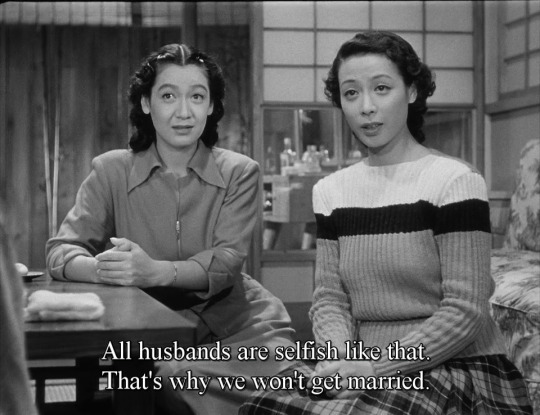
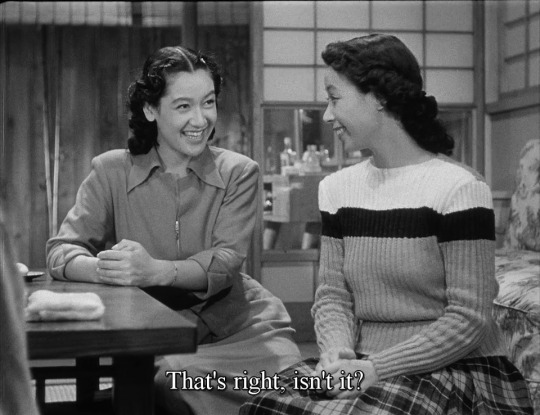
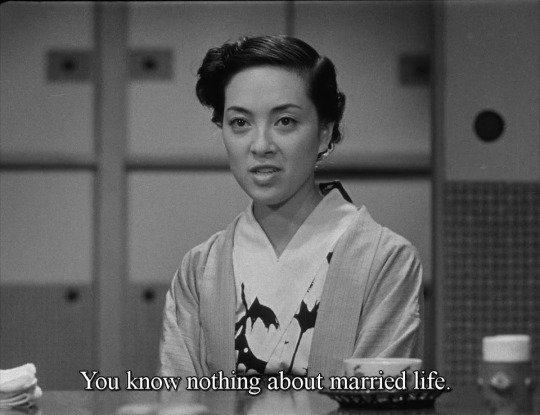
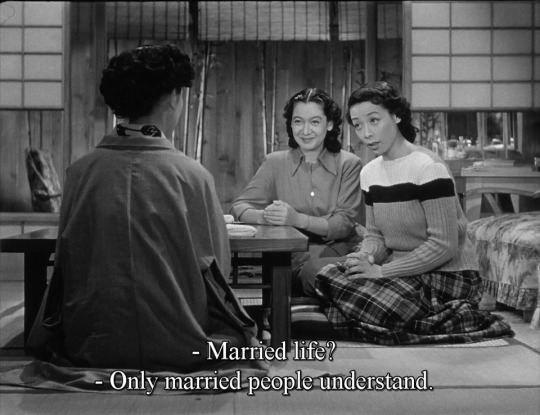
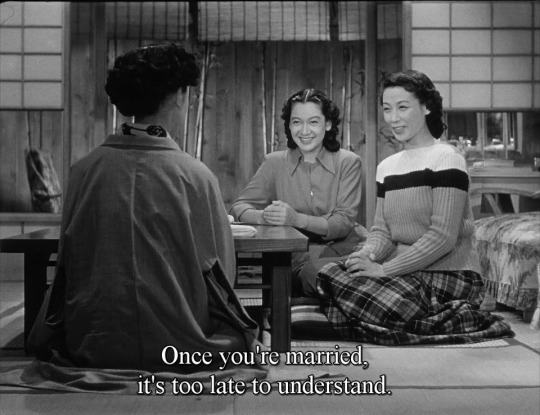
Early Summer (Yasujirō Ozu, 1951)
#Early Summer#Yasujirō Ozu#Yasujiro Ozu#Ozu#1951#Bakushû#Bakushu#black and white#quote#Setsuko Hara#Chikage Awashima#marriage#comedy#feminism#freedom#Kuniko Igawa#understand
164 notes
·
View notes
Text


turned this random girl from my fyp into a gif lol
#just girly posts#girlblogging#girlblogger#girlcore#girl blog#2010s#early 2010s#female manipulator#gaslight gatekeep girlblog#aesthetic#angel posting#angelkin#angelcore#coquette angel#angel#femaleidol#female rage#divine feminine#divine female#female hysteria#feminism#im just a girl#tumblr girls#girlhood#girl interrupted syndrome#grunge girl#hell is a teenage girl#just girly things#manic pixie dream girl#lana del ray aesthetic
168 notes
·
View notes
Text
instagram
nbcnews
The election of Donald Trump as the next U.S. president has triggered a surge of social media posts and internet search interest in South Korea’s fringe feminist "4B" movement, which calls on women to refrain from dating, having sex with men, having kids and marrying men.
Over 200,000 people looked up the “4B movement” on Google on Wednesday, making it one of the top trending topics on the online search engine. Across TikTok, dozens of American women disappointed by election results have posted videos stating their intention to participate in their own version of the 4B trend.
The 4B movement, which began in South Korea 2018 in the wake of the #MeToo movement, has become a way for some women to protest misogyny, gender discrimination and violence against women, according to Meera Choi, a Ph.D. candidate in the department of sociology at Yale University.
Now, American women disillusioned with the government and Trump’s win say boycotting men and having children while their reproductive rights are dwindling could be one way to channel their anger and hopelessness.
Read more at the link in bio.
#Instagram#4b movement#radfeminism#radblr#radical feminist community#radical feminists please touch#radical feminism#2024 presidential election#election 2024#early voting#us election#kamala for president#tim walz#harris walz#kamala 2024#presidential election#harris walz campaign#kamala harris#harris walz ticket#harris walz administration#Trump vance#harris walz 2024#trump vance 2024#harris walz rally#breathe#self care#maga 2024#trump2024#donald trump#healing
104 notes
·
View notes
Text
The real "trans lobby"
Honestly I've seen plenty of TERFs, GC's and far right people saying that there's a whole "Trans lobby" of doctors who profit out of "rush transitioning" (specially when trans people are younger)
And they couldn't be more stupid, there's more profit doctors can made by gatekeeping HRT and that "living as your gender" shit to allow transition just to start, also for the whole disphoria shit tho
Just to get clear here's a hypotetical example of a late transition trans woman into the "correct way to transition" by a GC standard (minus the erradicating thing) would need to be over 18 (sometimes even 25), be a trans het woman (AGP's aren't acceptable only the HSTS's), live as a woman for 2 years (buying the whole closet, shave everyday), pay a whole package of laser shaving or electrolisys and be at the standard of the doctor so after this they are allowed to transition, lowballing a cost average of 10k USD
Then there's the HRT and the mind of the said trans woman filled with disphoria, which she's a late transitioner and would want to do a lot of surgeries to fit, lowballing here is about 100k USD
many sectors would profit out of the late transitioner trans woman which didn't want to suffer transphobia
Now into the so scary trans lobby logic, the same trans woman, she's just goes into HRT before she even make 18 just regular exams and stuff, she didn't even needed to pass the gatekeep stuff and the disphoria brainworms woudn't even consume her, the whole cost would be highballing 5k USD for a period of 10 years
yeah transitioning early is actually less profitable than transitioning late hence why there's no "trans lobby" over younger trans people, they just want to not be disphoric
the actual medical scandal would be when people find out that early transitioners can have a happier life (there's nothing wrong about late transitioning tho) and there's a profit out making trans people lifes miserable just to allow them do their own treatment
#trans discourse#transfeminism#trans#transtion#hrt#early transition#terf#feminism#translobby#the biggest medical scandal#lgbt#lgbtq community#medicine#surgeries#profit#far right lobby
91 notes
·
View notes
Text
All this pitting of sex against sex, of quality against quality; all this claiming of superiority and imputing of inferiority, belong to the private-school stage of human existence where there are 'sides', and it is necessary for one side to beat another side, and of the utmost importance to walk up to a platform and receive from the hands of the Headmaster himself a highly ornamental pot. As people mature they cease to believe in sides or in Headmasters or in highly ornamental pots.
Virginia Woolf, A Room of One's Own
#Virginia Woolf#A Room of One's Own#book quotes#quotes#social issues#early feminism#equality#literary quotes#english literature#on society#nonfiction#book recs#feminist book recs
5 notes
·
View notes
Text
To [Catherine] Macaulay, femininity was a social construct, a state to be worked for and attained, and while it might be in the interest of men to have docile, delicate and dim women, this arrangement certainly had little to recommend itself to women. She examines the attributes that are found desirable in women - particularly as they relate to beauty - and declares them to be the product of men's minds projected onto women's minds - and bodies - and which demand that women distort themselves in order to be desirable. While Macaulay's terminology may be different from that used today, her meanings are not far removed from many of our own.
Making one of the links made by Mary Daly (1978) in Gyn/Ecology, Macaulay refers to the then current practice of confining girls' feet in tight shoes and says ‘if littleness alone ... constitutes the beauty of feet, we can never pretend to vie with the Chinese, whilst we presume the privilege of walking’ (1790, p. 44) and she emphasises the way women are required to disfigure themselves in the effort to become attractive to men. She also comments on why men may find such disfigurement and deformity ‘attractive’: it enhances their images of themselves as strong, intelligent and superior. The attempt to appear small, delicate, fragile, and foolish, put upon women to promote the superiority of men, leads women to engage in the most appalling practices, states Macaulay. They are ‘obliged to lisp with their tongues, to totter in their walk, and to counterfeit more weakness and sickness than they really have, in order to attract the notice of the male’, and, echoing the words of Mary Astell of almost one hundred years before, says that men admire excellence, but love those they despise. So much for ‘romance’; she has few illusions about the relationship between the sexes.
-Dale Spender, Women of Ideas and What Men Have Done to Them
#dale spender#Catherine Macaulay#early feminism#feminist history#female oppression#female beauty#beauty standards
40 notes
·
View notes
Text
Blonde Ambition: Never Underestimate the Motivational Power of Pettiness in "Legally Blonde"
"You . . . got into Harvard Law?" "What, like it's hard?" Put away those textbooks. It's time to discover the power of petty vengeance in "Legally Blonde"!
Content Warning: Legally Blonde contains brief instances of sexual harassment/assault, one homophobic slur, bullying, and some eye-rolling examples of performative White feminism. Anywho, we stan Elle Woods in this household so viewer discretion is advised but also please watch this movie if you’ve never seen it. Spoilers for Legally Blonde ahead! For some people, their feminist awakening was…
#&039;00s comedy#&039;00s romcoms#college comedy#comedy#early 2000s#feminism#learning to be a true girls&039; girl#Legally Blonde#Luke Wilson#nostalgia#Nostalgia November#petty vengeance#Reese Witherspoon#romance#romantic comedy#romcom#self-actualization#Selma Blair#Victor Garber
50 notes
·
View notes
Text





FIONA APPLE - TIDAL
#fiona apple#fiona apple aesthetic#when the pawn#tidal fiona apple#tidal#sullen girl#slow like honey#paper bag#sleep to dream#girlblogging#girl blogger#feminine#life imitates art#female manipulator#light feminine#manic pixie dream girl#femcel#dark femininity#weird girl#dream girl#girl interrupted#feminism#female rage#divine feminine#femme fatale#90s vibes#early 2000s#90s aesthetic#90s#90s grunge
36 notes
·
View notes
Text
More autobiography
...I've rambled here about my art series. I haven't written much more about my life, but there is so much more, so here I go again. I left off in my teens, circa 1965, wandering New York, sneaking off from my suburban New Jersey home to explore and wonder and wander. Finally I graduated high school. My mother scored me a job in Monticello, NJ, at Swinging Bridge Lodge. It was a fabulous summer, I had my first sex, my first love, my days were filled with waiting tables and learning how to water ski from beautiful boys who wanted into my pants, my nights bartending (I was only 17 but everyone ignored that). My hair pulled up, a fake braid down my back, strumming my guitar, sitting behind the bar, cigarette dangling from my lips, wailing out Buffy St Marie and Joan Baez, life was sweet. It was then, one glowing evening sitting on the back porch of the Marina Restaurant, listening to Phil and Fanny Hype, the owners, chatter from the kitchen, gazing out across the lake, I visualized myself in my 80's, looking back at a life filled with adventures, telling my tales, and I knew between now and then I had to fulfill that self-prophecy...live my life to its fullest; grab every token, follow every path that presented itself, never let an opportunity go by. That was the real beginning, the intent to life my life to its fullest.
The summer passed. I returned to my NJ suburban home. I already had sculptures and drawings in a gallery in Englewood, the only artist showing, but Sharon Cohen, the owner, was so supportive she had somehow convinced my parents to let me pursue my studies at the University of Hartford Art School. It was a disaster. I didn't know how to be a student, I didn't follow the rules, I didn't understand or even know the rules and my fuck-it-all attitude annoyed the professors. The following summer, counselling at some Jewish sleep-away camp in upstate New York, teaching little people how to water ski, I met a girl who talked me into quitting school and getting a job at Columbia U. I just did it. The next day I was driving back home, I shucked the camp, college, and other people's ideas of what I should be doing with my life and slid out of it like an old, ratty, worn-out coat. I started commuting to my job at Low Library at Columbia on 116th St in NY, renovated my brother's unused bedroom into an art studio, got a bunch of drawings accepted at the Marissa del Rey Gallery on Madison Avenue, and my new life was underway.
Life slid into perfection. The 60's in New York was filled with civil disobedience, marches and sit-ins against the Vietnam war spilled out from Low Library onto the campus. I started seeing a boy who edited an underground newspaper filled with anarchy and insurrection, his tiny apartment in the Village smelled of Brussel Sprouts and cat litter and pot. Coming home at 2am stinking of Mary J, stoned out of my mind, sitting at the piano, composing and flying high. Commuting daily to my mindless job, weekends painting, drawing, exploring art, showings at my 2 galleries.
Mom decided I was drifting. Hear this voice, slightly Jewish NY accent, saying "Hally, you need something to fall back on. I signed you up for Katherine Gibbs. Go, you need a real job." Mothers. Can't live with them, can't be born without them. What could I do? I didn't have an alternative, the ultimate was given. My brother was living in Englewood with his friend, Dan Hennessey (yeah, he wasn't born in Toronto, he was born in Demarest, NJ -- Hi Dan, give me a call sometime) but he wouldn't let me move in, so I was trapped.
So I learned typing and shorthand. I hated every minute of it until I met Cheryl Vernon. Kindred spirit, gorgeous face with a marring split lip, we wore huge hats (hats were a must have at Katie Gibbs), white kid gloves that turned black from subway soot, heals under 2", skirts below your knees. It's 1968. Beatles, Donovan, folk rock. At the end of class every day we put our shoes and hats in our lockers, we rolled up the waists of our skirts to show our thighs, we put on our hip-high white patent leather boots that were definitely meant for walking, see-through shirts, chocolate Nat Sherman's delicately held to our glossy painted lips, we sauntered down Fifth Avenue with the rest of the girlie brigade.
0 notes
Text
I love Steph's origin as told in the Secret Origins 80 page giant- I just overall think it strengthens her character by giving her a lot of pathos and adding to her heroism (which isn't something writers were focused on in her actual intro in detective comics #647 since she was just meant to act as a plot device back then) BUT there is one tiny detail in it i will begrudge, and that is the portrayal of her having a minor love at first sight moment for tim
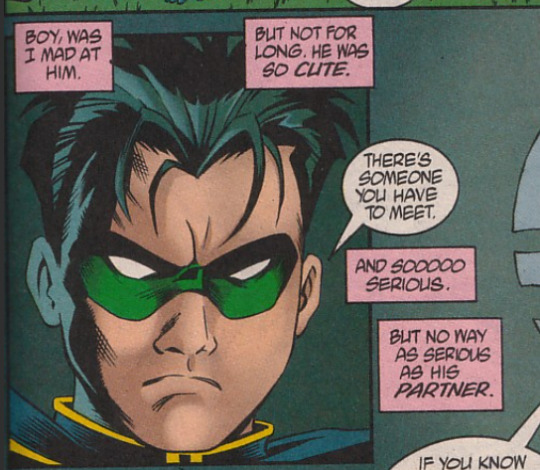
Secret origins 80 page giant, ID in alt
(or well, technically this was their second meeting in that story (the brick was the first) so...love at second sight?)
Mostly because Stephanie showed no interest in her introduction and only showed romantic feelings towards Tim AFTER this moment here:
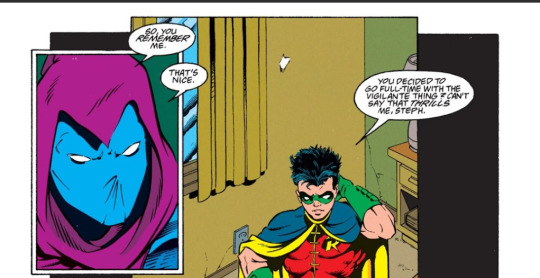
Robin (1993) #4, ID in alt
Straight up the progression here goes:
The adventure in 'tec where they first meet -> Tim investigating the same crime scene as Steph -> she beats him up not knowing it's him at first, apologizes but says he shouldn't have scared her -> he remembers her/the moniker she goes by -> they talk about plot for a few pages -> Stephanie starts flirting
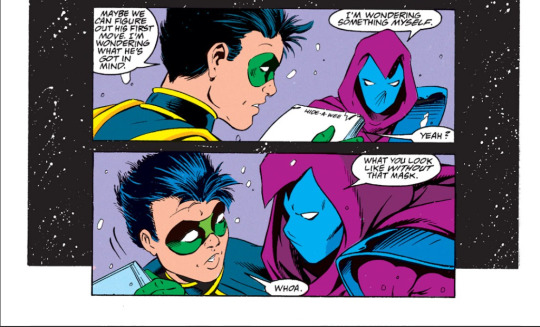
Robin (1993) #4, ID in alt
Which...is so fascinating to me and says so much about Stephanie. She highlights the fact that Tim "remembered" her. Like. Steph. Girl. This is our bar? It's sweet but kind of speaks to how much Stephanie is ignored at home/how little and sporadically she's shown interacting with her peers (and rarely ever the same kids twice). Her idea of peak romance is just...being on someone's mind even when you're not there.
Kind of also adds layers to Steph's proclivity towards jealousy later on, a manifestation of her insecurity and loneliness (though don't get it twisted, she's not written this way bc Dixon and co think it's an interesting character flaw, they wrote it bc they think it's an inherent character flaw of (particularly young) women/girls, which is very apparent in how he approaches Ariana's character as well from what I've read)
Also the fact that Steph becomes so smitten for Tim almost immediately after this is (a few issues later she aggressively flirts with him during AN ACTIVE HOSTAGE SITUATION. WHERE SHE'S THE HOSTAGE) again is kind of a mixture of kind of funny and sad. One boy is nice to her once and she's fully ready to wife him. Girl you are deranged (affectionate) (concerned)
#ramblings of a lunatic#dc comics#stephanie brown#tim drake#timsteph#meta#< ??? ig#robin 1993#made this post and forgot to finish. saved it in drafts. saw posts that annoyed me. proceeded to finish it#the subset of fans who think they're doing a righteous feminism by giving steph more flaws than she has in canon...headaches#yes flawed female characters are important representation no i dont think you projecting chuck dixons conservative values onto her-#-is doing her character a great favour. if so you need to commit to the bit and make tim a stone cold nark /j#sorry okay im done vaguing. there's real things going on in the world that matter. the bad take is the mind killer etc etc#anyway the zero to 100 progression of early timsteph is fascinating. on the one hand i know it's mostly a product of its time#both in terms of portrayals of romance (esp teen romance) and partially of women and girls by dixon (not extremely boy obsessed-#-but there's a. dark shadow of the boy crazy trope. a gentle whiff of it in the air. just a little)#but bc this aspect isn't blatantly/egregiously author bias i choose to analyse it#i could also analyse how steph in general is portrayed as liking guys she can't/shouldn't have a little#(her crush on the much older detective in bg2009 and also tim a little bit w/ the secret identity thing)#(but that's a whole other discussion. also that aspect of the romance in bg2009 is. also a little sexistly motivated-#-and also dropped part way through to an extent so like..not exactly ripe for analysis)#ANYWHO i love you Steph <3 you're unwell and yet so adorable and compelling Steph <3
155 notes
·
View notes